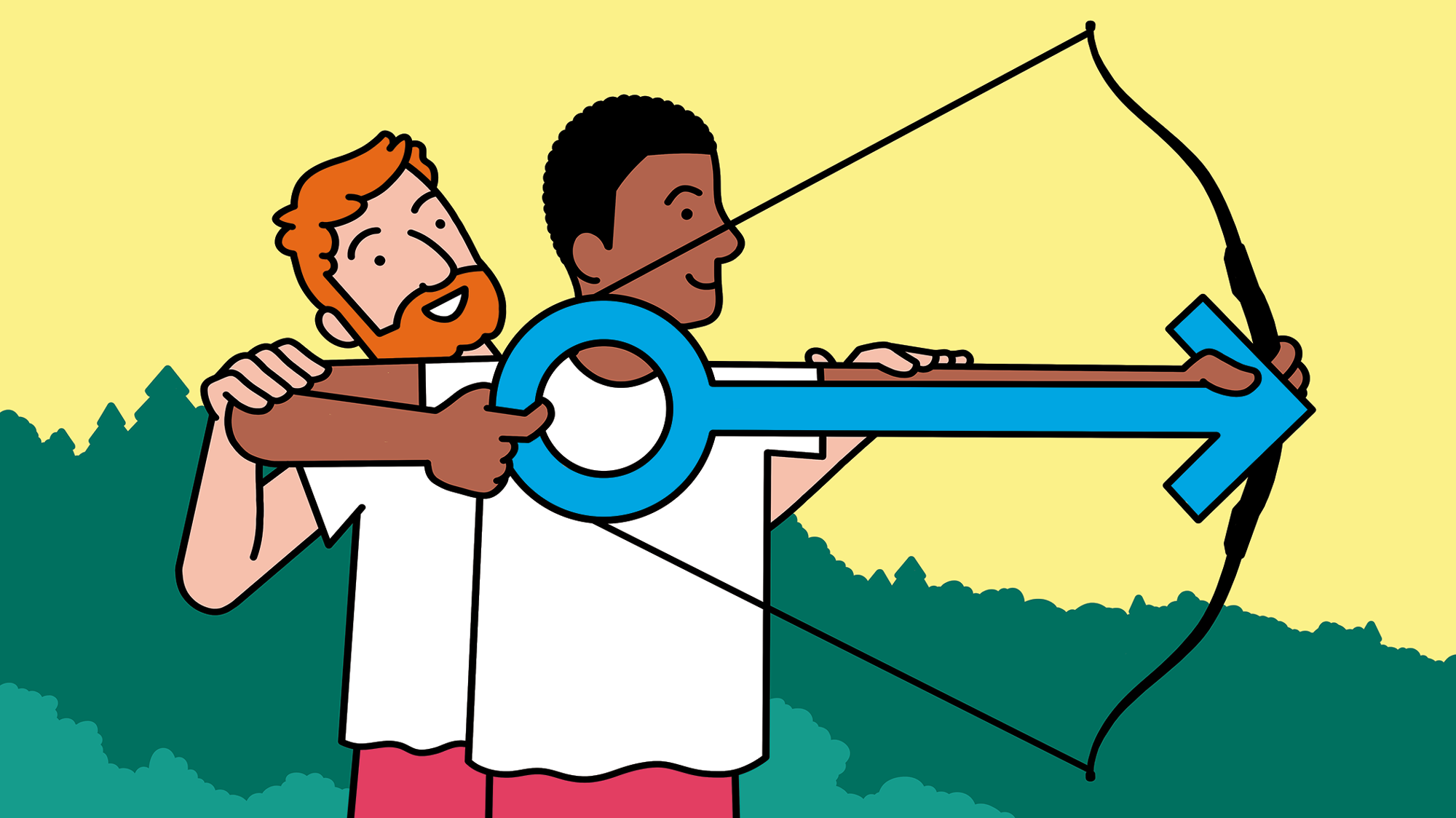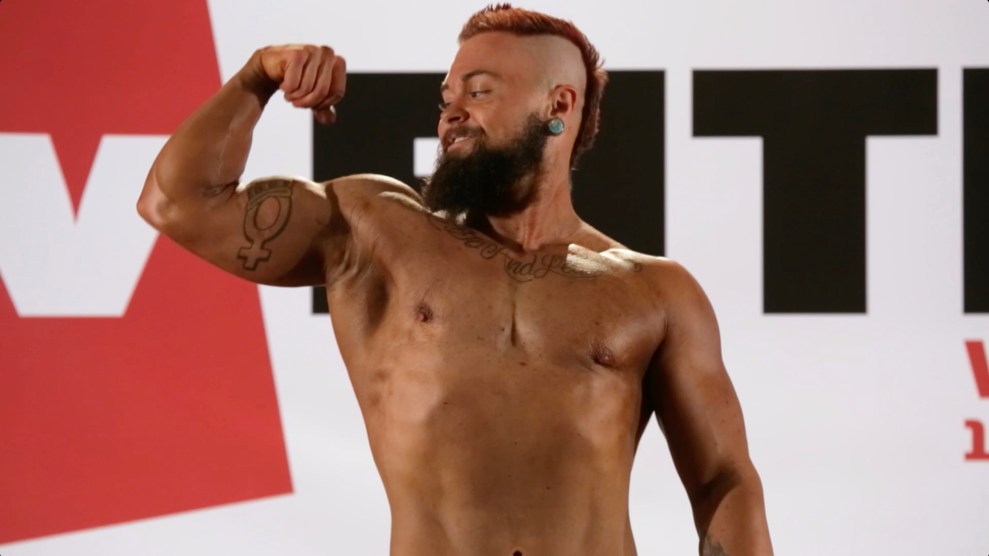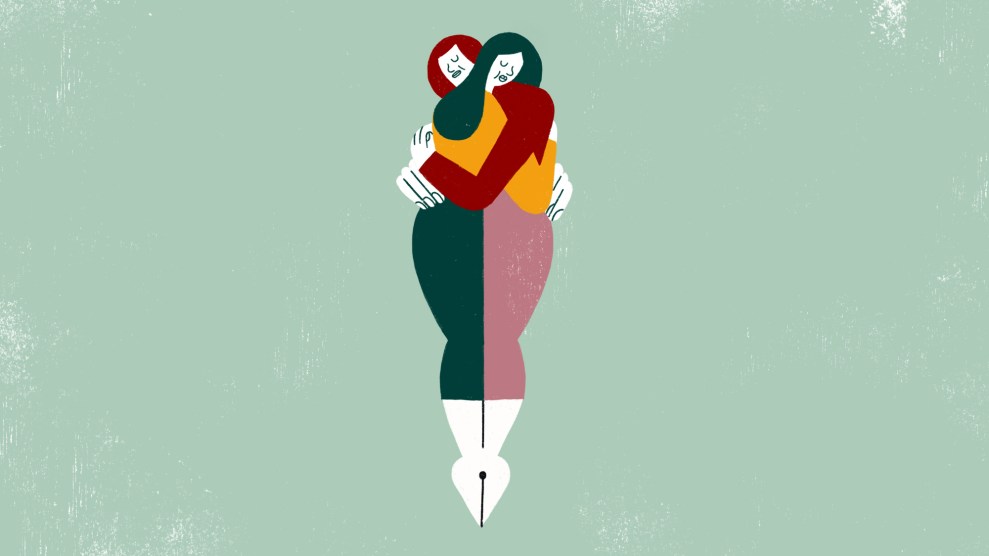Randi strolls around the dining hall on the first day of camp wearing a worn leather holster on his belt, but no gun. Instead, he’s packing an STP (“stand to pee”) device that, in case it isn’t obvious, helps men without penises urinate while standing up. It’s made of deep-blue plastic, and its butt pokes out of the holster like a real pistol.
He walks up to Rocco. “Is this all right?”
Rocco is distracted and harried in the way of all camp directors. “Is what all right?”
Randi lifts his shirt, indicating the holster. “I just want to make sure it’s obvious it’s not a gun.”
Rocco stops flipping through paperwork. “Dude, it’s obvious that’s not a gun.”
Rocco Kayiatos, 38, is one of three founders of Camp Lost Boys, a weekend retreat for transgender men. He is compact, bearded, and tattooed, with a soothingly deep voice. His friend and co-founder Justin Chow, 37, is the tall, cool cucumber to Rocco’s nerveball of energy. The third partner is “stealth”—he keeps his trans life private. Together, they came up with the idea of hosting a summer-camp-type experience that trans guys “didn’t get to have as kids, or didn’t get to experience as boys,” Justin explains.
“All the trans spaces I have ever been in are either drunken dance parties or academic and health conferences,” Rocco adds. “We never just got to have dedicated space for good old clean fun.” To that end, Camp Lost Boys offers archery, ropes courses, hiking, swimming, zip lines, horses, biking, campfires—all the usual fare. “There are spaces for transmasculine people or people masculine of center,” Rocco points out, “but no other event that caters to men who want to be seen as, read as, and live their lives solely as men.”
FACES OF THE LOST BOYS
T Cooper, a documentary filmmaker, shot these portraits of fellow campers.
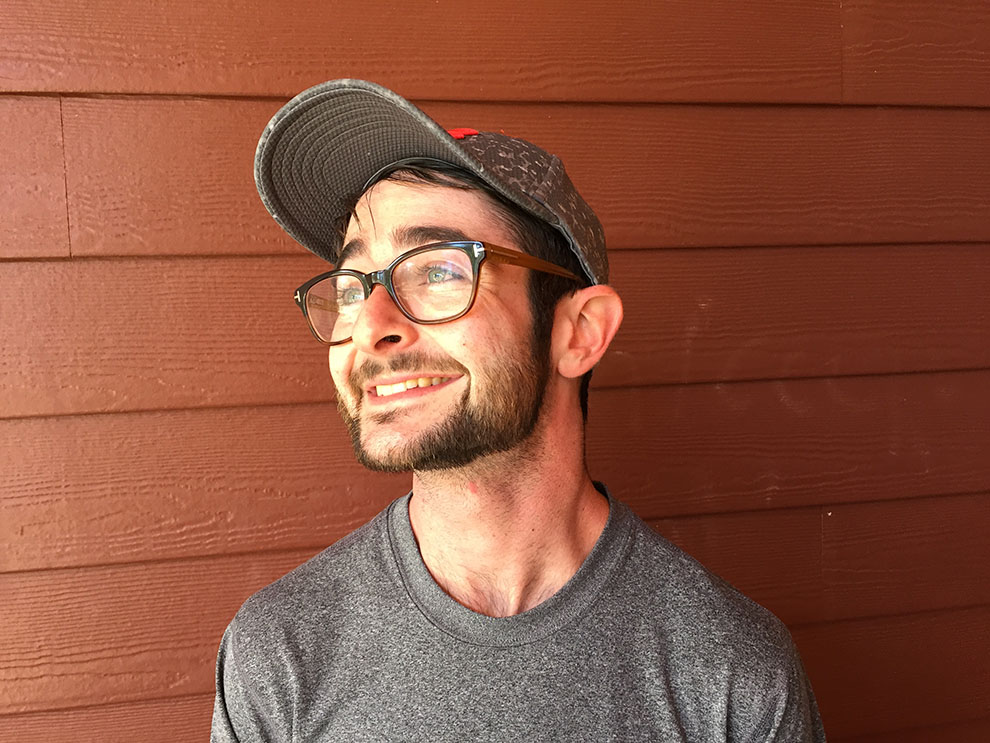
MATTHEW, 25: “Camp is an opportunity to celebrate some of the quieter victories of transition, the ones where we get to live our lives as happier people.”

WULF, 34: “I come from a small town, and now I live in a different, even smaller town. I don’t know any trans men other than the ones that I met at camp.”
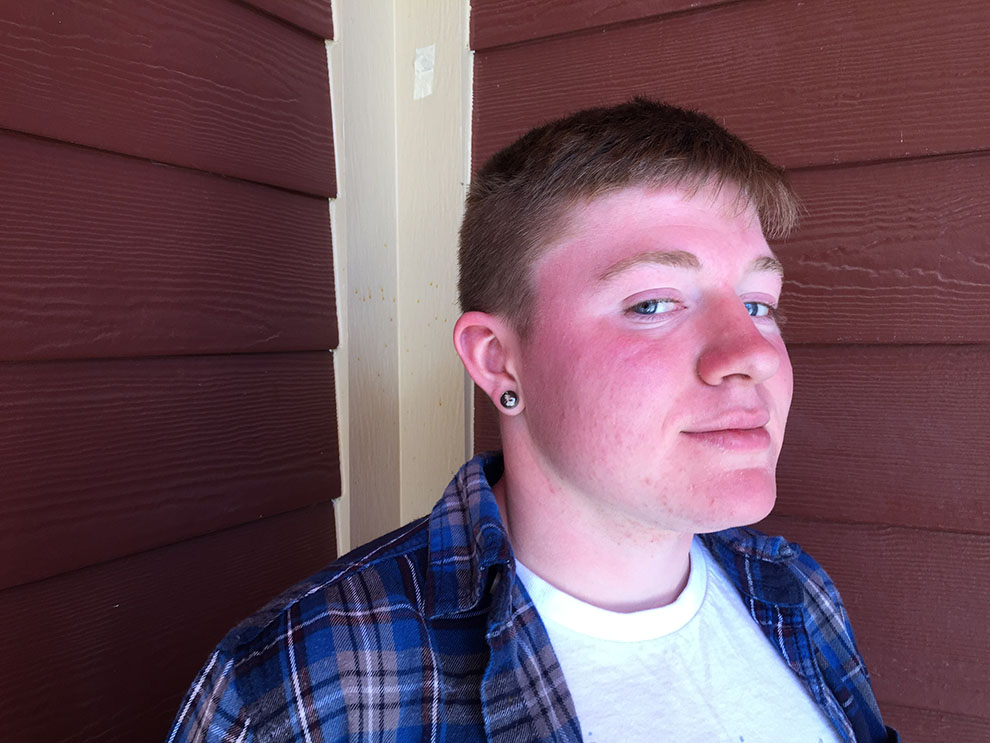
KAYDON, 21: “I want to be the kind of man that you can count on. I want to be an incredible husband and father. I want to be strong and dependable. I want to be the friend you call because you aren’t sure who else to call.”
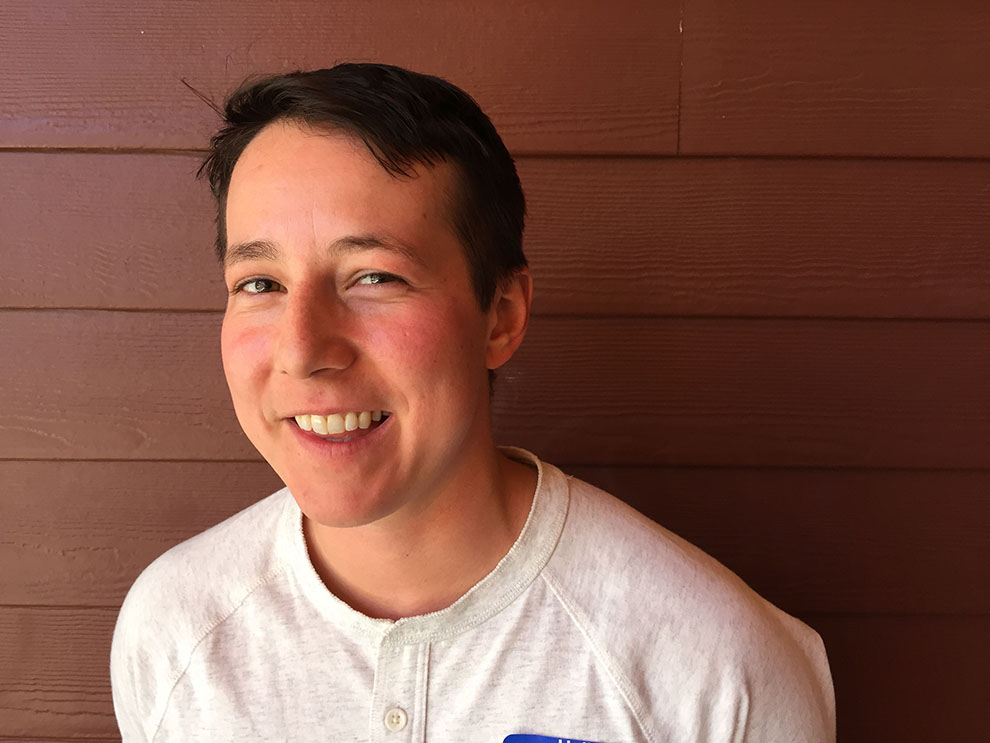
LUIS, 33: Camp “was one of the most special times in my life, and likely will be the catalyst for changes in the way I see myself, the types of friendships I seek, and the communities I identify with. It was just unreal.”
I attended the inaugural Camp Lost Boys session near Los Angeles last fall and was back in April for the second session, at a ranch outside Denver that’s also used as a Jewish summer camp. The first thing you might notice when you roll up is the way the guys hug one another—well, right after noticing how short most of us are. There are no cautious hand-slaps leading to awkward man-hugs, but full embraces, where you melt into each other for a long moment of genuine communion. Nobody cares where their arms go, either—in the “real world,” the girls’ arms go around the neck and the guys reach around the torso, and you must always hug this way, like you’re slow-dancing at prom, lest people sense something is off.
The Colorado registration takes place in a log cabin where Rocco and Justin dispense bunk assignments, programs, backpacks, patches, and mugs emblazoned with the camp’s Park Service-inspired logo. By the time a fifth camper lifts his Sharpie to ask whether we should put preferred gender pronouns on our nametags, Rocco looks set to explode: “No PGPs!” he yells, startling some new arrivals. “We are all men here!”
You can see the profound confusion in the eyes of the younger campers, who—unlike us older guys (many of whom transitioned more than a decade ago)—have marinated in a culture of inclusivity wherein every meeting or class begins with a roll call of names and pronouns so that everybody feels recognized. “To me, it’s not a courtesy to be asked your preferred gender pronoun,” Rocco continues, a bit more calmly now. He refers to the Lost Boys mission statement: “It’s been communicated explicitly that this camp is for self-defined men, even if being identified as a man can look different for everybody.”
Indeed, there’s an impressive range of masculinity on display that night in the strictly Kosher dining hall, where meals are lovingly prepared by two accomplished trans restaurateurs from California. Some of the guys have been on hormones for years, some only months, and some not at all. They’ve had top surgery or bottom surgery—or both. Or neither. They are bearded dudes in flannels and work boots, femme-leaning guys in tank tops and skinny jeans, balding fathers with dad bods and cargo pants, nerdy coders in crisp button-downs, guys with long hair, guys with shaved heads and gold chains, and fellas who might be called “tomboys” by the average cisgender person but who identify as men.
After announcements, Justin, a former Army intelligence analyst, plops down at a cafeteria table with a second helping of polenta and ratatouille to reflect on the irony of trying to inhabit maleness in a society that has had it up to here with men. “I think we struggle with our past lives and the men we now want to be but are sometimes afraid to be, because of how much we want to avoid perpetuating toxic masculinity,” he says. “Sometimes there’s no room for trans men to enjoy our masculinity without guilt, or fear of triggering those within the transgender umbrella.”
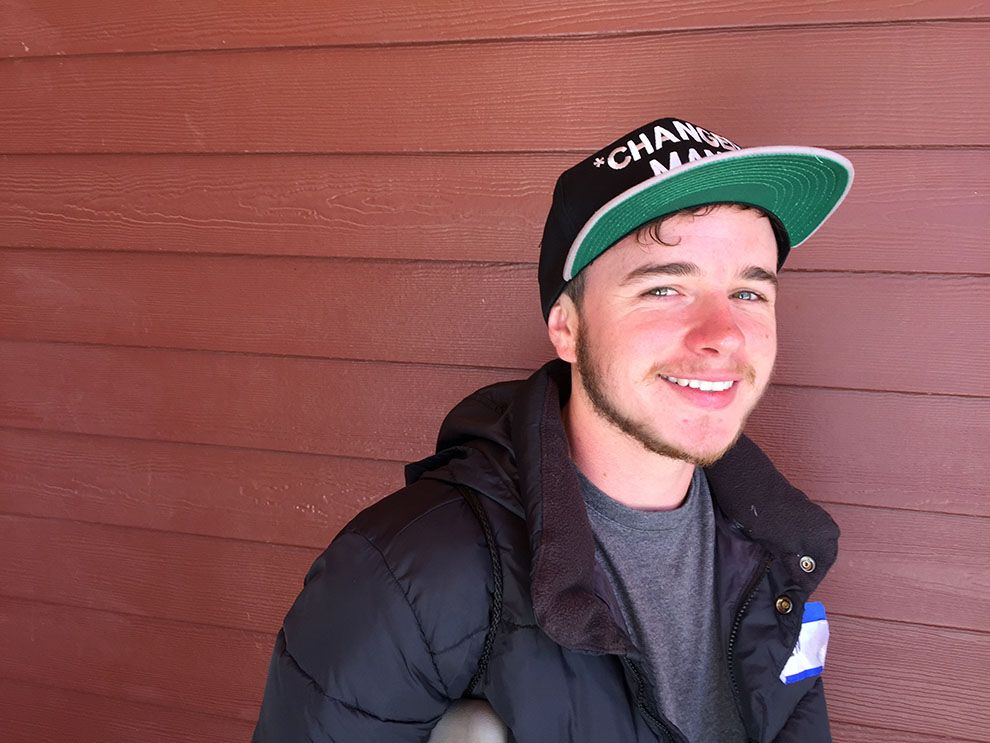
BEN, 25: “I do think that there’s a specific emotional awareness that comes with the transmasculine experience that’s almost inherent. A lot of people have to work really hard to see the world from this perspective that we were given—in a blessed and cursed way. That’s one of the privileges of being trans. There are so many life lessons that I wouldn’t trade for anything, but there’s also the struggle in the day-to-day life of just navigating having this body in this world.”
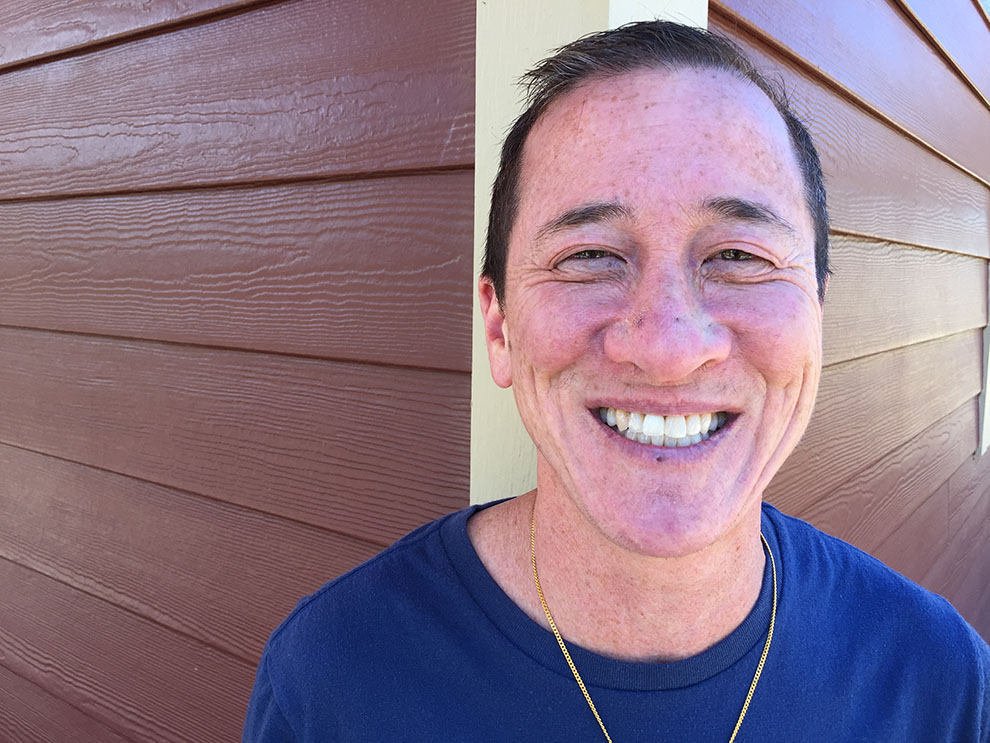
As men who were socialized female, most of us are used to repressing our needs and identities for fear of claiming too much space—of manspreading, literally and metaphorically. At both camps, I saw guys being careful not to hog the best tie-dye colors, or inviting others to go first for food or the zip line, or springing into action when somebody blew out a knee during a shirtless volleyball match. The cisgender men I hang out with generally aren’t thanking others for helping them get to where they are. Nor are they talking about avoiding poisonous expressions of their gender, or worrying that their attendance at a men-only gathering might alienate people who aren’t included. That’s not to say trans men aren’t capable of expressing toxic masculinity, but those guys apparently stayed at home.
Instead, I meet dudes like 25-year-old Ben of Mariposa, California, whose transition was the subject of a PBS documentary called Real Boy. Over vegetarian lunch one day, Ben tells me he’s been preoccupied with embodying a gracious sort of masculinity: “If we don’t want men to be associated with violence, anger, lack of communication skills, then what does it mean to be a man now?” He pauses to scan the dining hall. “This camp provides so many examples.”
And a lot of fun, too. Some guys opt for early-morning boot camp, climb the rock wall, or touch a horse for the first time. They play basketball and take lassoing lessons from the staff cowgirls. There are casual sessions around trans-affirmative health care, relationships, parenthood, finances, and sobriety. I screen Man Made, my new film about trans-male bodybuilders, nervous as hell given the relevance of the subject matter to this crowd. There’s also a meetup for men of color and a discreet bottom-surgery show-and-tell. But mostly we just sit around and talk—about life, death, hair loss, skin care, and, of course, sex. I overhear a younger camper telling another how the “ridges way up in the vagina are the G-spot.” A few of us older—mostly married—guys look at each other for a beat and then shake our heads. “That’s not the G-spot, man!”
“I don’t know from vaginas!” admits the would-be sexpert.
Kaydon, a 21-year-old from a traditional family in Sanford, North Carolina, tells me how, in high school, his parents threatened to kick him out if he insisted on transitioning. He wants to know what it’s like being trans at 45. “Meeting older guys like you helps me feel like I’m not alone, that I’m not some monster or freak,” he admits.
Willy, 55, from Oakland, is back for his second camp. “What’s not to love?” he asks. “There has always been a need for separate spaces for people who share a certain demographic experience. I come from the lesbian-of-color movement of the ’80s, and let me tell you, it was really important for us to get together then.”
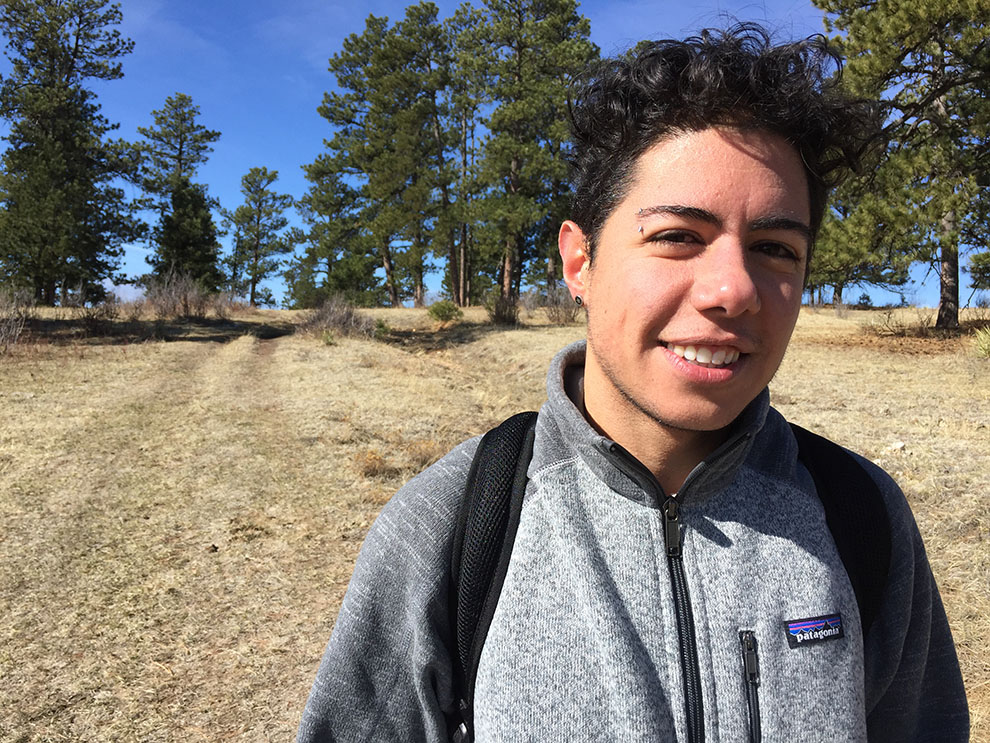
TYLER, 32: “This camp has given me an opportunity to hang out with other trans guys in a setting that did not involve drinking. It’s a summer-camp-like experience, which is something I never had as a kid. I feel a sense of brotherhood that I’ve never felt before, and that is truly amazing.”
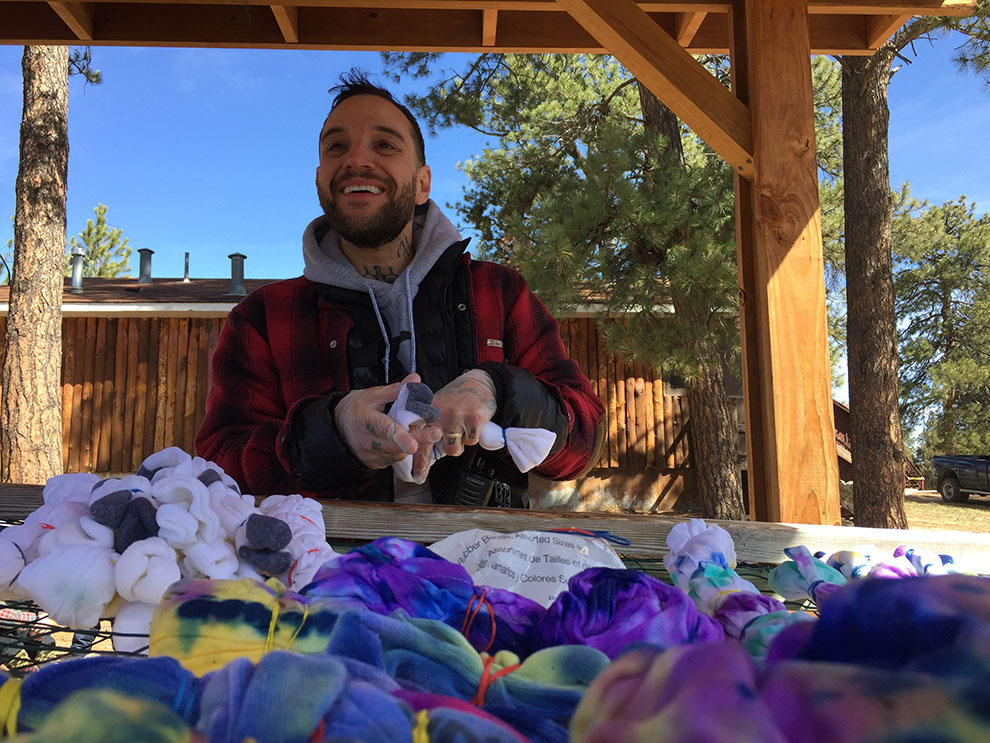
ROCCO KAYIATOS, 38: “Being in this space gives me the most stripped-down, raw perspective on what it means that we were all alive and allowed to be there together. That we made it, and we want to be better versions of ourselves. Better people, better sons, husbands, community members—and better men. We can examine the complexity of what it means to be a man. But sadly, that has little to no space in the queer community because often, as trans men, we are called to task in the way cis men are—which erases our history and our struggles.”
I get it. Being a trans man at a gathering of trans men is nothing short of liberating. It frees the parts of our minds normally consumed by the anxieties of living in a world where trans people are at best tolerated or fetishized, and at worst physically attacked. It creates spaces where peace and calm may enter.
Randi stops wearing his STP holster after the first night of camp—it’s not needed. Here, as Real Boy Ben puts it, “I don’t have to go into the bathroom and wonder, ‘Is someone listening to me while I take toilet paper? Is someone noticing that my feet are facing a certain way?’” Peter, 41, usually fears standing out by the fit of his pants or by his gait, but “even in the airport on the way here, I start to let my guard fall away.”
During a muddy morning hike toward the end of the weekend, about 25 of us wade through the pines, dodging road apples en route to a “haunted” cave. Tyler, a 32-year-old New Yorker, reflects on the man he wants to be: “I’m trying to find a balance, because it’s important not to completely obliterate my femininity,” he says. As we enter a clearing that overlooks a yellow plain, he adds, “For me, taking testosterone was more to get other people on the same page about my identity.”
“I’m learning that I don’t have to hate everything feminine about myself,” concurs Luis, a 34-year-old San Franciscan. “I can make room for it, which is something I’ve known rationally but have had a hard time accepting.”
As we traverse a dry creek, a bald eagle with maybe a seven-foot wingspan swoops overhead. My breath is stolen by the sight. For the rest of the hike, I can’t stop thinking about that eagle, the icon, the improbability of seeing him in that moment. It was a gift as rare and magical as this line of men snaking through the wilderness. We’d trod so many paths to arrive at this place, some of us scarcely making it in the face of a 41 percent rate of attempted suicide. Now, for two and a half days out of entire lifetimes, we are boundless. Fully inhabiting our bodies. Bodies that are, at least here, a majority—bodies that are, for once, nothing special.
